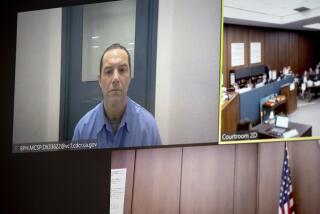Dealing with the DNA evidence backlog
First it was the Los Angeles Police Department that was reported to be sitting on a backlog of untested DNA evidence in rape cases, then the Sheriff’s Department, and now, according to a Human Rights Watch report released Tuesday, each of the other 47 police agencies in the county as well.
Scientific and technological advances can outpace police departments, swamping them with evidence and high expectations while leaving them with insufficient lab capacity or personnel resources. But DNA testing has long ceased to be a new technology. Rape victims agree to physical examinations in the belief that their cooperation will aid in the capture and conviction of their assailant, and the faith they place in law enforcement is broken when the evidence sits for years, unanalyzed, in frozen storage. That’s the case with more than 12,000 “rape kits” in Los Angeles County, Human Rights Watch reported.
California law enforcement agencies and prosecutors have two years from the date of the crime to test the evidence. That type of limitation is reasonable, taking into account the rights and needs of both defendant and victim. An indefinite period would endlessly put off closure while failing to give the lab any incentive to get the job done with dispatch. The longer the evidence is sitting around, even in deep-freeze, the greater the chance of loss, mix-up or contamination.
Now, Assemblyman Ted Lieu, a Democrat from Torrance, has introduced a bill to extend the period to five years. AB 383 cleared the Public Safety Committee on Tuesday.
It’s a worthy bill in that it would prevent destruction of potentially useful evidence. By allowing agencies more time to deal with their backlogs, it might permit some prosecutions to go forward that might otherwise be thrown out.
But the bill should be seen as an emergency fix; it does not get to the core of the problem. The real solution isn’t to give investigators more time to let evidence sit around; it’s to give them enough money to do their lab work.
That requires an acknowledgment that rape and sexual assault are top law enforcement and prosecutorial priorities. In the current economy, cities and local law enforcement are strapped for cash and would be foolish to expect enough state support to eliminate the backlog.
Until there is funding, Lieu’s bill will help. It doesn’t permit police to plead poverty as a way to avoid testing DNA evidence. The bill would perhaps relieve some pressure, but it also should apply some, providing another reminder that rape is a high-priority crime and that if it’s worth the pain and trouble to collect the evidence, it’s worth testing it as well.
More to Read
A cure for the common opinion
Get thought-provoking perspectives with our weekly newsletter.
You may occasionally receive promotional content from the Los Angeles Times.






